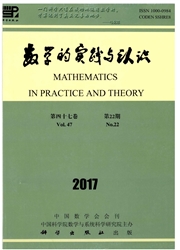

 中文摘要:
中文摘要:
有效的环境治理符合新型城镇化的特定要求,能够体现以人为本的基本思想.基于数据包络分析法对中国大陆30个省市区2007-2011年环境治理的财政支出效率进行动态测度与评价,并对其收敛性进行检验.结果表明:我国环境治理的财政支出效率总体呈现下降的趋势,区域之间差距逐步缩小,但区域内部差距逐步扩大;全国处于生产前沿面的省区数量不断减少且空间分布也发生了变化,同时,全国范围和东部地区存在驴收敛和卢收敛,通过引入控制变量,全国、东、中、西部地区均实现了条件卢收敛,对外贸易水平、经济发展水平和产业结构分别成为促使东、中、西部区域财政支出效率条件收敛的重要因素.
 英文摘要:
英文摘要:
Environmental governance effective conforms to the specific requirements of new urbanization and reflects the basic idea of people-oriented. This paper measures and evaluates the efficiency of fiscal spending on environmental governance dynamically, as well as tests the convergence of 30 provinces in China from 2007 to 2011 based on data envelopment analysis. The results show that: the efficiency of fiscal spending on environmental governance is in decreasing trend overall, regional gap is narrowing gradually, however, regional internal gap is widening; the number of production frontier provinces reduced constantly and the spatial distribution has changed, at the same time, nationwide and eastern regional are in σrconvergence and βconvergence. Through the introduction of control variables, nationwide, eastern regional, middle regional and western regional are in conditionalflconvergence, foreign trade, economic development level and industry structure has become the important factor to realize the conditional convergence of efficiency of fiscal expenditure in eastern regional, middle regional and western regional respectively.
 同期刊论文项目
同期刊论文项目
 同项目期刊论文
同项目期刊论文
 期刊信息
期刊信息
